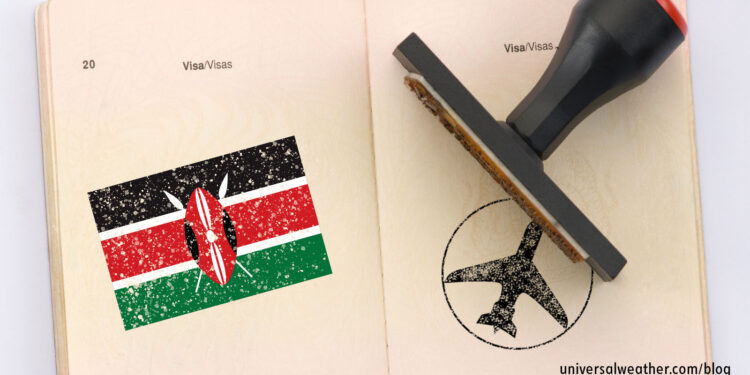Business Jet Ops to Kenya: CIQ, Documentation & Tech Stops

This is a post by author Victoria Swai. Victoria is a permits officer for Kilimanjaro Aviation Logistics Centre (KALC), a subsidiary of Universal Weather and Aviation, Inc. which is headquartered in Mwanza, Tanzania. Victoria is an expert on permits for the African region and can be contacted at victoriaswai@universalaviation.aero.
This business aviation blog post is part of a series on operating in Kenya and continues from our last article: “Business Jet Ops to Kenya: Customs, Immigration, and Quarantine.”
While documentation for clearing Customs, Immigration, and Quarantine (CIQ) is straightforward, you’ll want to confirm all applicable requirements with your 3rd-party provider and ground handlers in order to avoid delays upon arrival. CIQ processing may take longer than normal in certain circumstances. And, if you’re planning to obtain a visa on arrival, this could result in delays of up to two or three hours.
The following is an overview of what you need to know:
1. CIQ clearance process
After you arrive in Kenya, your ground handler will transfer passengers, crew members, and luggage to the main terminal for CIQ clearance. At most airports passengers clear CIQ in the same lines as scheduled commercial passengers. Clearance times vary depending on airport and time of day. At Nairobi (HKJK) it may take 15-30 minutes to clear, depending on commercial airline activity at the time. At other airports CIQ clearance is often as quick as just a few minutes.
2. Expedited CIQ clearance
Although operators may request onboard or private lounge CIQ clearance at an additional cost, there are no guarantees, and this is usually not a permitted option in Kenya. The only exception, normally, is for diplomatic or VVIP flights where CIQ clearance may be accomplished within an airport lounge – separate from commercial passenger clearance. In the case of Nairobi Wilson (HKNW) – a business and private aviation airfield – CIQ clearance is usually very fast as very few scheduled commercial flights operate there.
3. Required documentation
When you arrive in Kenya, a gen dec stamped by customs authorities from the previous stop must presented. All passengers and crew members need to have passports with at least six months’ remaining validity. Arrival/departure cards must be completed for operations to/from Kenya. There are different card formats, depending on nationality. In Kenya passengers – and not their ground handler or agent – must complete arrival/departure cards. Your ground handler will supply these forms, but Kenyan authorities normally only allow handlers to fill out these cards in cases of language barriers.
4. Visa considerations
Visas are not needed for crew members regardless of nationality as long as they’re listed on the stamped gen dec from the previous stop. Visas for passengers are always required, other than for certain African nationalities. It may be possible for passengers to obtain visas on arrival, but this depends on passenger nationality. There are charges for visas on arrival, and passengers should anticipate possible visa processing delays. It’s always best to obtain visas prior to arrival for passengers who require them. If visas are needed on arrival, always check with your 3rd-party provider or ground handler if applicable nationals are eligible for them.
5. Vaccinations
Be mindful that yellow fever vaccination and certification of the vaccination are required for all crew members/passengers visiting Kenya. As the incubation period for yellow fever vaccines to become effective is 10 days, it’s important to consider these requirements well before day of operation. Crew members/passengers who do not have evidence of yellow fever vaccination will likely be denied entry to Kenya.
6. Tech stops
Average turnaround time for international tech stops at airports of entry in Kenya is about one hour, depending on size of aircraft and services needed. However, be aware that if you’re on the ground more than one hour, you may need to request a parking spot. A confirmed parking slot helps ensure you’ll have sufficient time to complete all needed services.
7. Additional reading: Business Aircraft Ops to Kenya – Series Index
Note: Links will be updated as articles are published.
- Part 1 – Airport operations
- Part 2 – Ground handling
- Part 3 – Fuel, security, and additional services
- Part 4 – CIQ
- Part 5 – CIQ, documentation, and tech stops
- Part 6 – Permits and slots
- Part 7 – Flight planning, weather, and NOTAMs
- Part 8 – Hotels and local area
Conclusion
Vaccination requirements are taken seriously in Kenya. It’s important that all arriving passengers/crew members carry up-to-date and complete vaccination records. Though CIQ clearance is straightforward, always ensure that appropriate visas for passengers are in order prior to travel to Kenya.
Later, we’ll discuss permits and slots for Kenya and their impact on your trip.
Questions?



